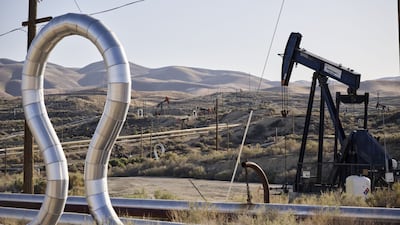Oil prices extended their gains on Friday after the 23-producer Opec+ alliance stuck with its output plan and ratified a small increase for the month of June as concerns over weak demand in China and the Russia-Ukraine conflict continue to weigh on the market.
Brent, the global benchmark for two thirds of the world's oil, was 1.99 per cent higher at $113.1 per barrel at 9.02pm UAE time on Friday. West Texas Intermediate, the gauge that tracks US crude, gained 2.14 per cent and was trading at $110.5 a barrel.
Opec+ agreed on Thursday to stick to its output plan and add 432,000 barrels per day of crude to the market in June, even as oil prices rise after the EU announced a phased strategy to ban oil imports from Russia by the end of this year.
"Production policy from the group of exporters is essentially on auto-pilot because members don’t want to risk overwhelming oil markets with supply even as there are material supply risks around Russia’s oil output," said Edward Bell, senior director of market economics at Emirates NBD.
Even with additional barrels of oil coming to the market "the odds are that Opec+ will fail to hit that level as some members run up against production capacity constraints: market surveys show the Opec members of the alliance added just 10k bpd in April compared with a target level of 274k bpd", Mr Bell said.
Oil prices are up more than 60 per cent from the same period last year, caused by the Russia-Ukraine conflict as well as a faster-than-expected economic recovery and also years of underinvestment in the energy industry after prices collapsed in 2014, which restricted the output capacity of some producers.
The Opec+ alliance worked to bring back 5.8 million bpd in an effort to restore supply that was greatly reduced after the onset of the Covid-19 pandemic in 2020. The alliance achieved a historic reduction of 9.7 million bpd between May 2020 and July of last year.
The Russia-Ukraine crisis that erupted at the end of February has softened the global economic recovery and pandemic-related curbs in China are derailing the economic momentum of the world’s biggest oil importer, which makes it more challenging for Opec+ as it assesses market dynamics and decides future oil production levels.
China's movement restrictions in its largest city, Shanghai, as well as in the capital Beijing, to contain Covid-19 outbreaks are raising concerns about demand for oil. Millions of people have had to stay indoors in Shanghai for more than a month as the government carries out mass testing of its population to isolate infected people and stem the spread of the disease.
"Mobility restrictions in China are weighing on oil demand and likely supported the cautious stance," said Giovanni Staunovo, commodity analyst at UBS.
"Russian crude exports in April increased by more than 500k bpd versus March, keeping the oil market well supplied for now. And lastly, dwindling spare capacity within the group means that a faster production increase would reduce that spare capacity even more."
Chinese mobility restrictions and a sixth round of Russian sanctions from the EU will be closely watched by markets, Mr Staunovo said.
"All these factors point to a tightening oil market this summer, with demand outside China holding up," he said.
Emirates NBD estimates Brent will average $120 a barrel for the second and third quarters, while WTI will hover at $115 a barrel over the same period.


